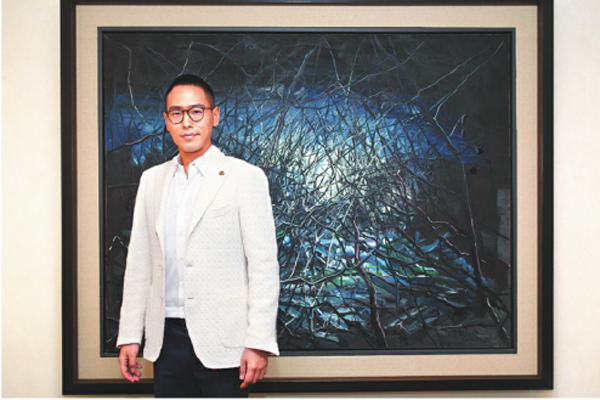Young at art
By Deng Zhangyu | China Daily | Updated: 2017-09-20 07:44
 |
| Young art collectors Tong Chi Kar represents the new generation of the elite art-collection world in China. He is more open to sharing their ideas with the public and buying works from both home and abroad than his predecessors. [Photo provided to China Daily] |
Clear idea of collection
Unlike Tong's expressed use of instinct to buy art, Huang Yu adopts a systematic approach. He has definite ideas on what to buy and has more than 300 pieces, mostly conceptual works and videos.
Last year, Huang held a show of his collection in his hometown, Chengdu. The exhibit was followed by a forum involving young Chinese collectors. Huang wanted to provide a platform for them to exchange ideas.
Huang was born in a wealthy family. His mother is a successful businesswoman and has a museum in Chengdu.
Huang was fascinated with auto racing and became a racer in his early 20s. In 2003, he was hooked on bodybuilding and won a competition. However, these short-term interests soon gave way to his love of art.
In 2003, he headed to Beijing and founded an auction house with his elder brother. For several years, he bought only antiques-ancient Chinese paintings and porcelain-just like his parents' generation.
Huang went to Shanghai's China Minsheng Bank in 2008 and helped launch the first art fund in Asia. He applied to work at the Minsheng Contemporary Art Museum Shanghai when it was still in the planning stages. The move helped spur his purchases of contemporary art, which now account for a large part of his collection.
Huang learned art history at the museum and went to galleries, fairs and auction houses to buy art. He bought about 100 pieces of contemporary art within two years. He also bought emerging international artists' works, mainly for investment.
"I rarely sell pieces from my collections. I separate the investment part clearly from my collections," says Huang.
After years in the field, Huang says he better understands the development of contemporary Chinese art. He knows which artists should be in his collection and why. He buys works by those who possess a critical footprint in art history, such as Yang Fudong, Liu Xiaodong and Ding Yi.
"I hope to conduct a world tour of my own collection, specific to a certain art form, such as video," he says.
Huang is a Buddhist. His mother influenced his religious beliefs. His house still contains many Buddha sculptures.
He spends half his time on art and the rest on his business, which is involved in the cultural, entertainment and investment sectors. His aim is to list the company in Hong Kong.
He travels frequently for business and to expand his collection. He owns a high-end club in Chengdu to display his collections and share them with his friends, many of whom are from the financial sector.
Huang's Art Chengdu fair next year will work with 30 galleries worldwide to showcase works that appeal to young people.
"I often feel tired and want to sleep for a day," says Huang.
"But I feel my energy return very quickly when I think about art."
























